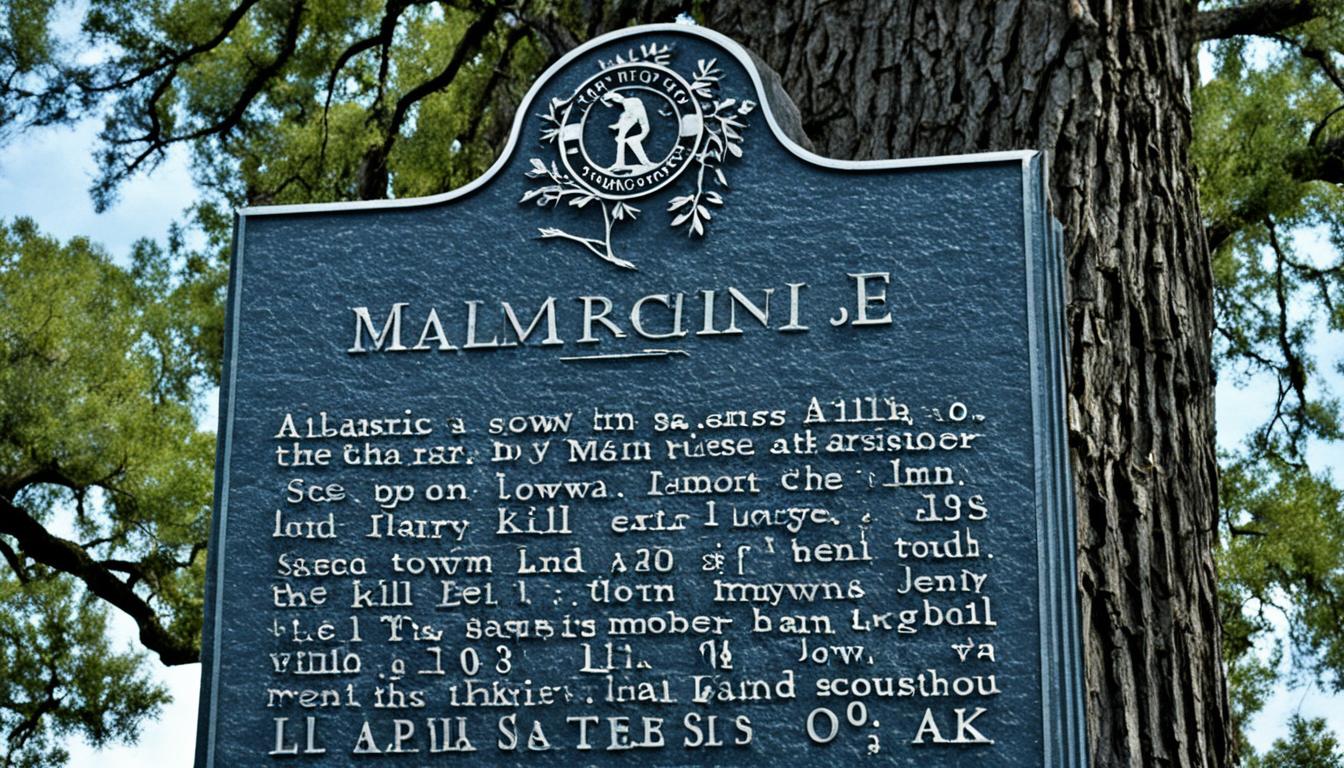In a fitting tribute to the transcendent power of literature and its impact on the rule of law, the Alabama State Bar Association unveiled a monument that stands as a testament to the timeless ideals of justice and morality. Erected in 1997, this monument celebrates a literary character whose profound influence extends far beyond the pages of a novel and into the hearts of those who strive for fairness in the practice of law. Nestled on the storied grounds of the old courthouse in downtown Monroeville, Alabama, the monument serves not merely as a tourist attraction, but as an emblem of the ideals upheld by the legal community.
Key Takeaways
- The unveiling of the monument by the Alabama State Bar Association honors a character emblematic of justice.
- Located in Monroeville, the monument reflects the intersection of literary greatness and legal ethos.
- The character commemorated signifies the cultural and literary impact on the legal profession.
- This recognition by the Alabama State Bar Association highlights the narrative power to influence society.
- The monument stands as a symbol of encouragement for ongoing advocacy of noble ideals within the law.
Harper Lee and the Legendary Character of Atticus Finch
Born in the heart of Monroeville, Alabama, Harper Lee bestowed upon the world of literature a masterpiece that resonates with the themes of racial injustice and moral fortitude. Her novel, To Kill a Mockingbird, transcends mere storytelling, becoming a pivotal influence across generations and professions, especially within the sphere of law.
The Legacy of “To Kill a Mockingbird” in Literature and Law
The significance of To Kill a Mockingbird in both literary and legal circles cannot be overstated. Lee’s evocative narrative lays bare the complexities of human ethics, intertwined with a candid portrayal of socio-legal challenges. It is a text that has been pored over by students and legal professionals alike, each finding invaluable lessons within its pages.
Atticus Finch: A Symbol of Justice and Integrity
Within the novel’s landscape, Atticus Finch emerges as an iconic figure, emblematic of justice and unwavering integrity. His character has not simply inhabited the realms of Maycomb but has inspired countless individuals to uphold the values of fairness and equality. As a fictional lawyer, Finch’s persona has notably affected real-world perspectives on law, leading many to aspire to his level of ethical practice and dedication to societal good.
The Commemorative Atticus Finch Monument in Monroeville
In the heart of Monroeville, Alabama, a tribute to literary greatness and moral integrity stands with quiet dignity. The Atticus Finch monument, erected by the Alabama State Bar Association in 1997, is not just a commemoration of a beloved fictional character, but also a recognition of the values he represents.
Strategically placed on the northeast side of the historic courthouse, the monument captures the essence of the town’s pride in its association with Harper Lee’s “To Kill a Mockingbird.” Every etched word on the monument is a reflection of the community’s respect for justice and equality, concepts that Atticus Finch so powerfully embodied.
Visitors to Monroeville will find the monument’s presence a testament to the enduring impact of literature on societal values. As a figure of unwavering principle, the statue of Atticus Finch serves to inspire attorneys, residents, and tourists alike, reminding all of the fundamental virtues that are essential to both the legal profession and society at large.

- Monroeville’s homage to a hero of fiction, enshrined in bronze and stone, extends beyond a mere physical form; it is a cornerstone of the town’s identity.
- The Alabama State Bar Association celebrates the power of storytelling through their sponsorship of the monument, acknowledging the bridge between narrative fiction and real-world justice.
- In the shadow of the courthouse, the Atticus Finch monument stands as an evergreen symbol of the pursuit for righteousness inherent within the human spirit—a beacon for future generations.
Ultimately, the presence of the Atticus Finch monument in Monroeville offers more than a photo opportunity; it provides a palpable connection to the communal heritage of Alabama and the universal aspiration for a just world. In this quiet corner of Monroeville, a story’s impact has transcended the pages to become an integral piece of the fabric of everyday life—a solemn promise for constant aspiration towards the tenets of justice, equality, and integrity.
In 1997 Alabama’s State Bar Association Recognizes a Fictional Hero
In an unprecedented move that acknowledged the profound influence of literature on the principles of law and justice, the Alabama State Bar Association solidified the bridge between fiction and reality. In 1997, they chose to honor a fictional hero who embodied the highest virtues of the legal profession: Atticus Finch from Harper Lee’s “To Kill a Mockingbird.”

Inscription’s Profound Message of Nondiscriminatory Justice
The monument, which now stands as a testament to the eternal quest for nondiscriminatory justice, carries an inscription that resonates deeply within the halls of justice. It emphasizes the imperative to act without bias, and to uphold the legal system’s integrity by ensuring fairness is accessible to all, echoing Finch’s legacy.
The Impact of Finch on the Legal Community
The impact of Atticus Finch on the legal community cannot be overstated. For many attorneys and judges across the nation, Finch’s unyielding moral compass and his commitment to justice despite prevailing social injustices serves as an inspirational paradigm. His demeanor and actions have influenced generations, instilling a belief in the power of law when wielded with ethical purpose.
Atticus Finch’s Influence on Culture Beyond Literature
The embodiment of moral fortitude and steadfast virtue in Harper Lee’s “To Kill a Mockingbird” has allowed Atticus Finch to transcend the confines of literature and emerge as a beacon within the broader cultural landscape. His principles and actions, etched into the American psyche, foster a universal appeal that resonates with the collective consciousness. In Atticus Finch, society finds not just a literary figure, but an enduring emblem of justice and the relentless pursuit of what is equitable and honorable.
Gregory Peck’s portrayal of Atticus in the 1962 film adaptation indelibly sculpted the character’s influence by bringing the stoic heroism of the courtroom into the living rooms of millions. As a result, Atticus Finch’s name has become synonymous with ethical leadership and courageous advocacy, echoing through the halls of justice, classrooms, and even the corridors of power. The reach of his influence was exemplified when former President Barack Obama, in a moment that bridged narrative fiction and real-world aspiration, invoked Finch as an exemplar during his farewell address.
The legacy of Atticus Finch continues to ripple through contemporary culture, inspiring new generations in various spheres of society. His impact goes beyond just influence; it motivates action and nurtures the ideals of fairness and dignity in the collective effort towards a more just society. As a character immortalized in literature and elevated by cultural reverence, the spirit of Atticus Finch endures as a guiding figure in the ongoing dialogue about integrity, morality, and the human condition.





